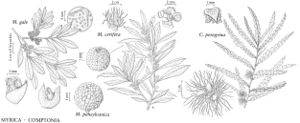Myrica gale
Sp. Pl. 2: 1024. 1753.
Shrubs, deciduous, much branched, to 1.5(-2) m. Branchlets purple-black, gland-dotted, glands brownish yellow. Leaf blade oblanceolate to obovate, 1.5-6.5 × 0.5-1.5 cm, ± leathery, base cuneate, margins usually minutely serrate, with 1-4 pairs of teeth usually restricted to distal 1/3 of blade, occasionally entire throughout, apex rounded or obtuse; surfaces abaxially pale green, glabrous to densely pilose, adaxially dark green, glabrous to pilose, both surfaces variously gland-dotted; glands bright yellow to orange. Inflorescences: staminate ca. 1-1.5 cm; pistillate to 1.5 cm. Flowers unisexual, staminate and pistillate mostly on different plants, occasionally on same plants. Staminate flowers: bract of each flower longer than stamens, stamens mostly 3-5. Pistillate flowers: bracteoles 2, accrescent and adnate to base of fruit wall, laterally compressed, glabrous but gland-dotted; ovary glabrous. Fruits ovoid, flattened, 2.5-3 mm; fruit wall smooth (no protuberances), without waxy deposit, with glandular deposit, enclosed by spongy bracteoles. 2n = ca. 96.
Phenology: Flowering spring–early summer, fruiting in summer.
Habitat: Coastal and inland swamps, bogs, borders of lakes, ponds, and streams
Elevation: 0-670 m
Distribution

St. Pierre and Miquelon, Alta., B.C., Man., N.B., Nfld., N.W.T., N.S., Ont., P.E.I., Que., Sask., Yukon, Alaska, Conn., Maine, Mass., Mich., Minn., N.H., N.J., N.Y., N.C., Oreg., Pa., R.I., Vt., Wash., Wis., Eurasia.
Discussion
I have seen at least two specimens of Myrica gale from Seneca County, Ohio, although they could have been very old collections. They apparently do not represent the current situation in Ohio.
The spongy bracteoles that surround the fruits aid in dispersal by acting as flotation devices in water. A. J. Davey and C. M. Gibson (1917), as well as others, have commented on the sexual distribution in this species. A. D. MacDonald and R. Sattler (1973) and A. D. MacDonald (1977) have used this species to investigate the nature of the flower/inflorescence in Myricaceae.
The pounded branches of Myrica gale were utilized by the Bella Coola to prepare decoctions taken as a diuretic or as a treatment for gonorrhea (D. A. Moerman 1986).
Selected References
None.
